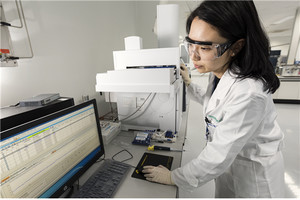
[이코노믹리뷰=황진중 기자] GC Green Cross (006280) starts shipping’Hunterase ICV (intracerebroventricular)’.
GC Green Cross (CEO Heo Eun-cheol) announced on the 3rd that it will ship Hunterase ICV, the world’s first treatment for severe hunter syndrome, to Japan. According to an analysis that the market penetration has entered the visible range as the initial supply of goods has been made within a month after acquiring the Japanese item license in January.
Hunterase ICV is a treatment in which a device is inserted into the head and the drug is administered directly to the ventricle. The existing intravenous formulation of drugs could not pass through the blood brain barrier (BBB) and thus could not reach the’cerebral parenchyma’.
GC Green Cross predicts that the sales of Hunterase ICV will be in full swing in Japan as early as two quarters. As the Japan Ministry of Health, Labor and Welfare (MHLW) is in the process of listing insurance drug prices, once the drug price is confirmed and notified, it is expected to be officially released and prescribed in the actual medical field. It is known that the Japanese medical community and patient associations also have high expectations for the efficacy and safety of the Hunterase ICV, which has been clinically confirmed.
Earlier last month, IV-type Hunterase was also shipped to China for the first time. In China, in September of last year, Hunterase was approved as the first treatment for Hunter syndrome in China, and is currently undergoing drug price listing procedures.
An official from GC Green Cross said, “The process is rapidly progressing so that Hunterase can be used by patients as a new treatment option. We will prepare for further production and supply plans to Japan and China in the future.”
On the other hand, Hunter syndrome is a rare congenital disease in which skeletal abnormalities and decreased intelligence occur due to deficiency of IDS (Iduronate-2-sulfatase) enzyme. In general, it is known that it occurs at the rate of 1 in 100,000 to 150,000 male children, and it is said that the number of severely ill patients with central nerve damage accounts for 70% of all patients with Hunter syndrome.
